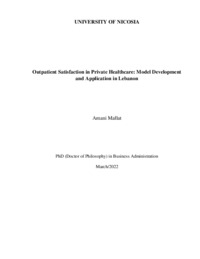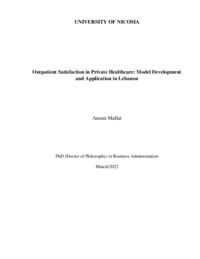-
This Thesis explores the area of outpatient satisfaction and the multiple correlates that influence the level of patient satisfaction. In specific, it identifies and examines the major key constructs affecting outpatients’ satisfaction, including perceived service quality, patient’s emotions, patient trust, and patient demographics to develop and empirically test a model that depicts and estimates the relationships between them toward managerial utilization by Lebanese private hospitals.
An extensive narrative literature review identified extant research knowledge and gaps. First, most of the previous research studies have focused on the link between perceived service quality and patient satisfaction. However, based on the literature, perceived service quality has multiple dimensions in different studies, leaving a hole in information with respect to what drives satisfaction in a given context. Therefore, there is a strong need for modeling dimensions specific to the situation in which services are provided. Second, patient emotions and patient trust, despite their importance to satisfaction formation, have been largely neglected in past satisfaction research. Third, the correlations between demographic factors and patient satisfaction should not be ignored when analyzing patient satisfaction. Based on the identified research gaps, a preliminary four-construct conceptual framework and their presumed relationships in the area of patient satisfaction were developed to be empirically tested in the Lebanese private healthcare industry.
The primary research adopts the positivism philosophy and designs and applies a mixed-method methodology. The preliminary study is conducted using qualitative research methods that include focus group discussions to examine possible dimensions of perceived service quality relating to satisfaction that go beyond those already mentioned in the literature; and the main study (using quantitative research method) is conducted through a survey questionnaire to test the conceptual model of patient satisfaction, with a sample size of 521. Before analysis, relevant explanatory variables were identified through Exploratory Factor Analysis with Varimax rotation, and bivariate analysis was carried out using linear regression, Spearman correlation, and Chi-Square analysis for the independent variables with the dependent variable. Based on the findings of these, the final framework is developed and presented.
Outpatient Satisfaction in Private Healthcare: Model Development and Application in Lebanon
- PhD thesis
- english
-
- Business Administration -- Marketing



